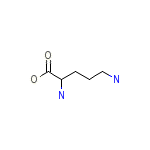OKG




OKG Brand names, OKG Analogs
OKG Brand Names Mixture
- No information avaliable
OKG Chemical_Formula
C5H14N2O22+
OKG RX_link
No information avaliable
OKG fda sheet
OKG msds (material safety sheet)
OKG Synthesis Reference
No information avaliable
OKG Molecular Weight
454.166 g/mol
OKG Melting Point
245-239 oC (hydrochloride salt)
OKG H2O Solubility
appreciable
OKG State
Solid (white crystals or powder)
OKG LogP
-3.376
OKG Dosage Forms
Capsules (500, 650, 750, and 1000 mg) and powder
OKG Indication
Used for nutritional supplementation, also for treating dietary shortage or imbalance. It has been claimed that ornithine improves athletic performance, has anabolic effects, has wound-healing effects, and is immuno-enhancing.
OKG Pharmacology
A non-essential and nonprotein amino acid, ornithine is critical for the production of the body's proteins, enzymes and muscle tissue. Ornithine plays a central role in the urea cycle and is important for the disposal of excess nitrogen (ammonia). Ornithine is the starting point for the synthesis of many polyamines such as putrescine and spermine. Ornithine supplements are claimed to enhance the release of growth hormone and to burn excess body fat. Ornithine is necessary for proper immune function and good liver function.
OKG Absorption
Absorbed from the small intestine via a sodium-dependent active transport process
OKG side effects and Toxicity
Oral, rat LD50 = 10000 mg/kg
OKG Patient Information
Dose should be taken before bedtime and on an empty stomach.
OKG Organisms Affected
Humans and other mammals














